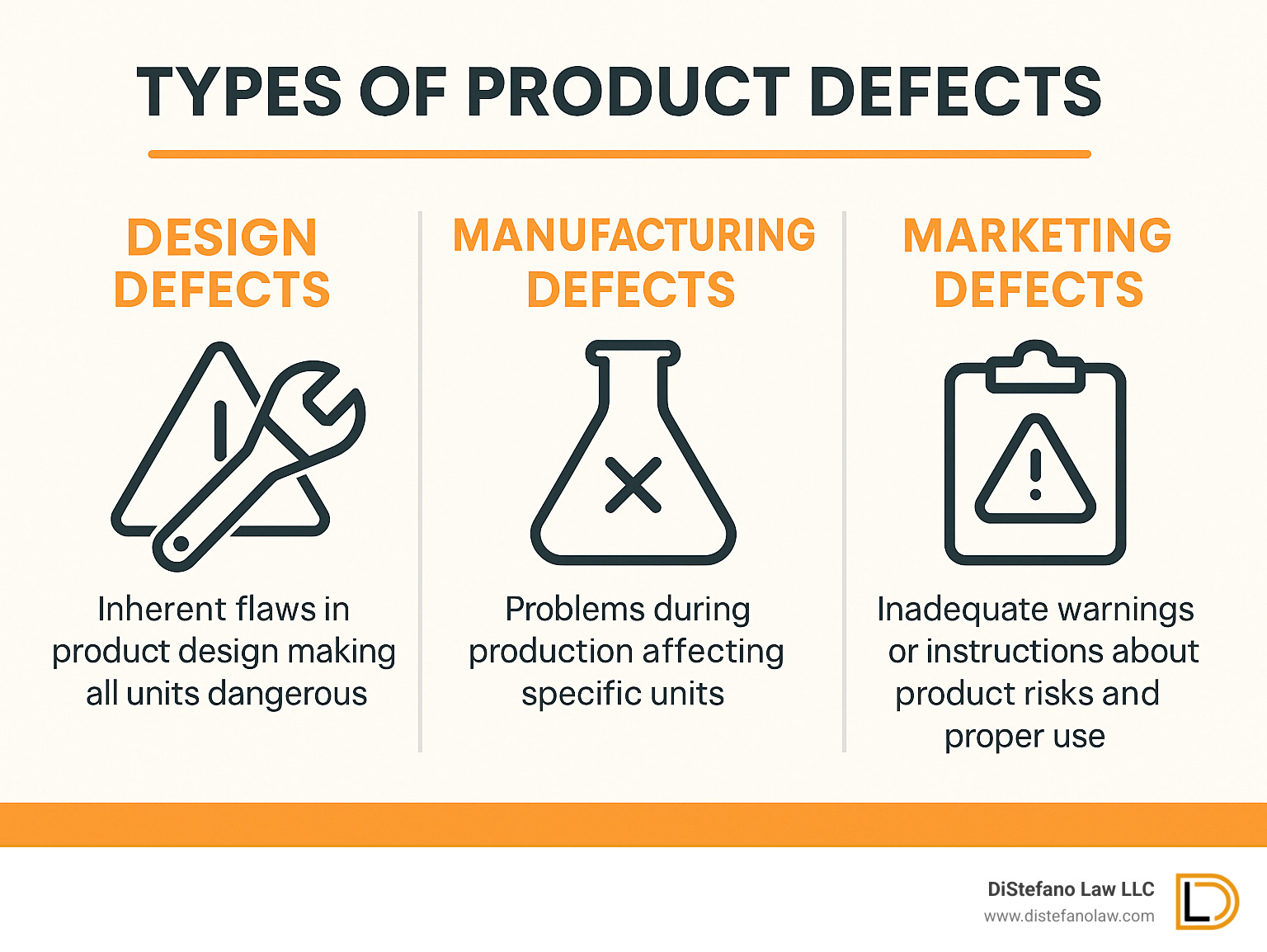Your Guide to Navigating Product Liability Claims in Florida
When you need a fort lauderdale product liability attorney, you are likely facing a difficult and painful situation. An injury caused by a defective product is a profound breach of trust, turning an everyday item into a source of harm. These cases are complex, often pitting an individual against a large corporation with vast legal resources. This guide will help you understand your rights and what to look for in legal representation.
Key Factors in Choosing the Right Attorney:
- Experience with product liability cases – This is more than just general personal injury experience. Look for attorneys who specifically handle defective product claims, as they possess a deep understanding of the intricate state and federal laws that govern these cases.
- Track record of results – A history of securing multi-million dollar verdicts and settlements is a strong indicator that a firm has the skill and tenacity to take on powerful opponents and win. It shows they are not afraid to go to trial if a fair settlement isn’t offered.
- Resources for complex litigation – Successful product liability cases require significant financial investment. The right firm will have the resources to hire leading expert witnesses—such as engineers, medical specialists, and design analysts—and conduct extensive investigations to build a powerful case.
- Contingency fee basis – You should not have to worry about legal fees while recovering from an injury. A contingency fee arrangement means there are no upfront costs, and you only pay if your attorney successfully secures compensation for you. This levels the playing field and ensures everyone has access to justice.
- Board certification – This is a critical distinction. Less than 2% of Florida attorneys are board-certified as civil trial specialists. This certification signifies the highest level of expertise, professionalism, and peer recognition in trial law.
Common Product Liability Cases in Fort Lauderdale:
- Defective vehicles – This includes cars, trucks, and motorcycles with faulty components like airbags that fail to deploy, defective seat belts, tire blowouts, or unstable designs prone to rollovers.
- Dangerous pharmaceuticals and medical devices – Cases can involve prescription drugs with undisclosed side effects, faulty hip implants, or malfunctioning pacemakers.
- Faulty machinery and power tools – Injuries often result from industrial equipment or consumer tools that lack proper safety guards, have electrical defects, or are prone to catastrophic failure.
- Unsafe children’s toys and products – This category covers toys with small parts that pose a choking hazard, cribs with dangerous designs, or products made with toxic materials like lead paint.
- Defective household products – Everyday items like kitchen appliances that catch fire, cleaning products with harmful chemicals and inadequate warnings, or ladders that collapse can cause serious harm.
Most Americans trust that the products they buy are safe for use. Unfortunately, when manufacturers cut corners on design, use substandard materials, or fail to warn consumers about known dangers, serious injuries can result. In Florida, you generally have four years from the date of injury to file a product liability claim, making it crucial to act quickly to preserve evidence and protect your legal rights.
As DiStefano Law LLC, we’ve been helping Fort Lauderdale residents steer complex product liability cases for over 40 years, securing millions in settlements and verdicts for our clients. Our experienced team understands how to hold manufacturers accountable when defective products cause harm, and we’re ready to fight for the compensation you deserve.

Easy fort lauderdale product liability attorney glossary:
- personal injury law firm fort lauderdale
- brain injury law firm fort lauderdale
- burn injury attorney fort lauderdale
Understanding Product Liability Law in Fort Lauderdale
When you buy a product in Florida, you have every right to expect it won’t hurt you. That’s not just wishful thinking – it’s actually backed by some pretty solid legal protections. Product liability law exists specifically to keep manufacturers honest and protect consumers like you when things go wrong. These laws acknowledge the significant power imbalance between individual consumers and large corporations, ensuring that companies that profit from selling products also bear the responsibility for their safety.
Think of it this way: when a company puts a product on the shelf, they’re making an implicit promise that it’s safe for its intended use. Florida law takes this promise seriously, creating a legal framework that holds manufacturers, distributors, and even retailers accountable when their products cause harm. This chain of responsibility ensures that there are multiple points where accountability can be enforced.
The beauty of consumer protection laws in Florida is that they recognize the reality of modern commerce. As consumers, we can’t possibly test every product we buy or understand all the technical details of how they’re made. We rely on companies to do their homework, conduct rigorous safety testing, and ensure what they’re selling won’t hurt us. When they fail, the law provides a path to justice.
When a fort lauderdale product liability attorney takes on your case, they’re essentially arguing that somewhere in the chain from design to your doorstep, someone failed in their duty to keep you safe. This manufacturer accountability isn’t just about being nice – it’s required by law, and there are serious consequences when companies cut corners to prioritize profits over people.
For more comprehensive information about how these laws protect you, you can explore more info about product liability on our site.
The Three Main Types of Product Defects
Not all product defects are created equal. When we talk about a defective product, we’re really talking about three distinct ways things can go wrong – and understanding these differences can be crucial for your case.
Design defects are perhaps the most serious because they affect every single product that comes off the assembly line. The flaw is inherent in the product’s blueprint. For example, if an SUV is designed to be top-heavy, making it susceptible to rolling over during a routine evasive maneuver, that is a design defect. The problem isn’t with one specific item you bought – it’s with the entire product line. Every consumer who buys that product is at risk.
Manufacturing defects are different beasts entirely. Here, the design might be perfectly safe, but something went wrong during production. This creates a dangerous anomaly that isn’t present in other identical products. Examples include a batch of prescription medication contaminated with a harmful substance at the factory, a single car assembled with a faulty weld on a critical component, or a swing set sold with a cracked chain link. The result is that your specific product (or maybe a whole batch) came out wrong.
Marketing defects might sound less serious, but they can be just as dangerous. This is when the product itself is fine, but the company failed to warn you about non-obvious risks or didn’t give you proper instructions for safe use. A classic example is a powerful medication that doesn’t include a clear warning about dangerous interactions with other common drugs. The failure to warn about hidden dangers or provide adequate instructions can turn an otherwise safe product into a hazard. The warning must be clear, conspicuous, and specific enough for a consumer to understand the risk.
These aren’t just academic categories – they matter because they point to different failures in the system and different parties who might be responsible for your injuries. Understanding the three main types of product defects helps explain why some cases focus on the manufacturer, while others might target the retailer or distributor.
Legal Grounds for a Product Liability Claim
When you’re hurt by a defective product, your attorney has several legal strategies available to pursue your case. The three main approaches – strict liability, negligence, and breach of warranty – each have their own advantages depending on your specific situation.
| Legal Theory | What You Need to Prove | Key Advantage |
|---|---|---|
| Strict Liability | Product was defective and unreasonably dangerous; defect caused your injury | Don’t need to prove company was careless – just that product was defective |
| Negligence | Company failed in their duty of care; this failure caused your injury | Can pursue punitive damages if conduct was particularly reckless |
| Breach of Warranty | Product didn’t meet promises made (express) or basic expectations (implied) | Often easier to prove; covers situations where product simply doesn’t work as promised |
Strict liability is often the most powerful tool in a product liability case because it focuses on the product itself rather than the company’s behavior. Under strict liability, if a product is defectively designed, manufactured, or marketed, the manufacturer can be held responsible regardless of how careful they were. This doctrine was developed to protect consumers, shifting the focus from the manufacturer’s intent to the safety of the product itself. This levels the playing field significantly – you don’t need to prove the company was negligent, just that their product was unreasonably dangerous.
The negligence approach focuses more on the company’s duty of care and whether they lived up to reasonable safety standards. Did they adequately test their product? Did they ignore known dangers? A breach of duty could involve a company learning about a safer, cost-effective alternative material for a product but choosing to stick with a cheaper, more dangerous one to boost profits. If you can show this breach of duty directly caused your injury through causation, you might be entitled to additional damages, including punitive damages for reckless conduct.
Warranty claims can be surprisingly effective. An express warranty is a specific, stated promise, such as a watch being advertised as “water-resistant to 100 meters.” If it floods during a swim, that’s a breach of express warranty. An implied warranty covers basic, unstated expectations – like the assumption that a chair will hold a person’s weight or that food won’t be contaminated. A breach occurs when the product is not fit for its ordinary purpose.
The good news is that you don’t have to choose just one approach. A skilled fort lauderdale product liability attorney will often pursue multiple theories simultaneously, giving you the best chance of success and maximum compensation for your injuries.




